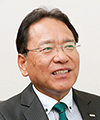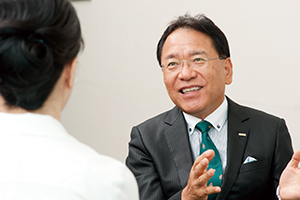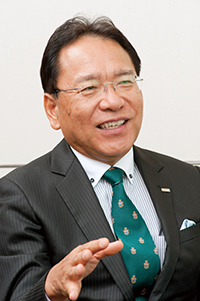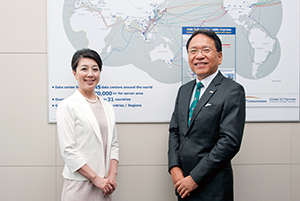 |
|
|
|
|
|
View from the Top Vol. 13, No. 10, pp. 1–5, Oct. 2015. https://doi.org/10.53829/ntr201510tp1  Establishing the NTT Com Brand in Global Markets through a Fine Balance between Risk and SafetyOverviewNTT Communications has made a string of acquisitions in overseas IT (information technology) companies and has achieved its target of 278 billion yen in overseas sales of cloud services ahead of schedule. In the highly competitive ICT (information and communication technology) global market, what does the company have to do to grow into a true global brand? We asked Tetsuya Shoji, President & CEO of NTT Communications, to tell us about the company’s vision and specific strategy for the future. Keywords: ICT, cloud, orchestration Global Cloud Vision: Constructing a rock-solid international infrastructure to become a global brand—Mr. Shoji, congratulations on your appointment as President & CEO. Please tell us about your present outlook and aspirations for the future. Since assuming this office in June, I have come across all sorts of things that I want to do. However, there isn’t enough time to do everything, so I must manage my time carefully, but to begin with, I would like to establish several new directions toward the creation of our next medium-term vision. In addition, I feel the weight of the responsibility as the final decision maker. Looking over the entire telecommunications industry, I would say that a revolution in information and communication technology (ICT) is taking place and that we are entering a very interesting era. For example, I believe that the cloud market in the United States is two to three years ahead of the market in Japan. From here on, if the Japanese market should grow with the same vitality as the U.S. market, a migration to the cloud should take off with an annual growth rate of more than just a few percentage points. This is an area with great potential! At NTT Communications, which has expanded in the area of network and infrastructure services, we have been able to construct a cloud on our own network in parallel with advancements in cloud computing technologies. As you know, the main players in this field, for example, Google and Amazon, have been expanding their market share. They are OTT (over-the-top) players that offer services on the infrastructure and network that we provide. Yet we have also been providing networks and infrastructures to our customers. While fulfilling our mission of providing highly convenient, safe, and advanced solutions by transforming such networks and infrastructures into software and services, we are also preparing a platform for the global rollout of one-stop, all-encompassing solution services, including providing applications. Our rivals are a strong bunch, but we take pride in stepping with them into the “sumo ring” to compete for global business. Our network services cover 196 countries, while our cloud services are provided from an infrastructure installed in 14 hubs in 11 countries and regions (as of the end of August 2015). In this regard, I also feel responsible for driving growth in overseas sales of the entire NTT Group through a business platform that provides these services to our customers. The idea is to combine the individual strengths of upper-layer service provider NTT DATA and global system integrator Dimension Data, and NTT Communications, which provides global support for the NTT Group. —What is your strategy for developing global brand power in such a fiercely competitive ICT market? In each overseas region where our Japanese corporate customers have set up bases, there exists a local telecommunications carrier that provides them with services equivalent to ours. Customers who are expanding their business both inside and outside Japan expect us to provide an ICT environment the same as that in Japan so that they can carry out their business in a stress-free manner. In reality, however, I can’t say that we have fully satisfied this need. To turn this situation around, we have announced a Global Cloud Vision to drive the growth of NTT Communications as a global brand. The name of this vision combines the new keywords “global” and “cloud.” With our Global Cloud Vision, we will address the problem of cyber security, for example, by protecting the customer’s communication environment in a comprehensive, one-stop, and global manner from the network and cloud infrastructure right up to the customer’s bases and terminals. As typified by the words “Japanese quality,” Japanese corporations and Japanese products have come to be known as highly reliable, safe, and secure. NTT Communications is also active in raising the level of quality. We regularly hold the Arcstar Carrier Forum in Japan to share our operations know-how with telecommunications carriers from around the world. This approach to quality is the reason why multinational customers have been choosing us over local telecommunications carriers. We also focus on reducing the amount of burdensome work that occurs outside of the customer’s main line of business such as by providing operations services with multilingual support. Our “Seamless ICT Solution” optimizes a corporation’s ICT environment on a global basis when migrating to the cloud. We have a proven track record in introducing this solution by establishing basic patterns tailored to management problems in a variety of industries. Due to our enthusiastic efforts in promoting to our customers our global rollout of wide-ranging services and solutions centered about cloud services, we have been able to achieve overseas sales of more than 278 billion yen.
—You have constructed a solid foundation. What further developments can we expect? I am confident that our Seamless ICT Solution will facilitate our customers’ management reforms. Going forward, I would like to further enhance our ICT operations and management that can be applied in a standardized way worldwide. Moreover, in addition to supporting Japanese companies in expanding their business, I am eager to offer our services to North American and European global enterprises listed in the Fortune 500. With regard to a medium-term vision for 2016 and beyond that I mentioned earlier, I plan to announce key issues for building up our business including specific service plans at the NTT Communications Forum 2015 that we are holding in the fall. As a particularly exciting endeavor, I would like to pursue services that can achieve network functions on general-purpose servers using network function virtualization (NFV) technology. At present, most network functions are provided as network appliances that are integrated with dedicated hardware, but NFV technology can achieve network functions on general-purpose servers without using dedicated hardware. I will also focus on orchestration services to achieve autonomic control, configuration, and management of complex computer systems consisting of hardware, middleware, applications, and services in those applications. Work occupies more than half of a person’s life: It must be enjoyed from a “know/like/enjoy” perspective—It is said that speed is the key for winning in the ICT business. What is the best way to develop a sense of speed in the ICT industry? I love amusement park rides, especially scary ones. In fact, I have ridden all of the scary and thrilling rides in Japanese amusement parks. I like to experience the force of gravity on my body. This is one way of developing a sense of speed. In work, a healthy balance is needed between risk and safety. Mario Andretti, the famous race car driver, said: “If everything seems under control, you’re not going fast enough.” In our work, this means that delivering reliable and maximum performance requires that we take ourselves to the limit and that we don’t forget to take on challenges even if that means taking on some risk. I also attach much importance to the words “know/like/enjoy” (pronounced “chikoraku” in Japanese) from the Analects of Confucius. In work, I believe we can apply these words as follows. When we are working on something, “knowledge” by itself can only take us to a certain level. However, if we come to “like” this work, we can move to a higher point and our performance will improve as a result. Then, if we come to truly “enjoy” it, work can take on added value above and beyond what we expected. Being optimistic in character, I have always thought it is important to make one’s work enjoyable. A working member of society spends about 70 to 80% of his or her waking hours in work-related activities. In other words, we spend the majority of our active time in life involved in work, so work can hardly have value if we don’t enjoy it. Certainly, “work should be fun!” While keeping these ideas in mind, I would also like to mention something else I value in terms of mindset. That is striking a balance between “improvement” and “innovation” when pursuing something new. Improvement requires continuity, while innovation requires the ability to produce something new that others cannot follow. As a leader, I am committed to the concepts of improvement and innovation in order to move forward and take on challenges swiftly with all employees in a unified manner. For example, when explaining to a customer how using the cloud can change that company’s business, it is necessary to stress that the cloud can be used not just to achieve a better system by introducing new technology but also to drive innovation in company management. My aim is to promote and enhance such proposal skills on a company-wide basis. Of course, training and developing employees for leadership roles is important, but it is also important to improve the skills of all employees in the corporate sales sector from the bottom up. If the ability to mutually communicate, train each other, and share information can be instilled in all employees of an organization, each employee should be able to absorb knowledge on advanced technologies and services. The result would be bottom-up improvement throughout the organization. Everyone has their own preferences and natural inclinations, so it is therefore important to put the right people in the right place for each mission. In addition to meeting directly with employees, those of us in management positions make an effort to implement optimum personnel assignment and training through objective indices and evaluations from others. It is also important that employees themselves be capable of self-evaluation. And most important of all is an employee’s passion and motivation.
—Having passion and motivation is certainly a vital element. Based on your experience, what kind of outlook should one adopt in facing one’s challenges? From my involvement in a project toward the privatization of NTT, I learned the importance of seeing things from above, of taking a comprehensive view. At that time, Nippon Telegraph and Telephone Public Corporation was a public service corporation under the jurisdiction of government ministries and agencies. However, against a backdrop of technical innovations, we were being asked to take a more active and liberal approach to providing our telecommunications services to the market. This was when I was selected to be part of a team whose mission was to achieve this. At that time, having a global outlook was rare, but the key issues here were to determine what kind of format to provide services in and how to contribute to making services more convenient for the user. We were being entrusted with a great deal of responsibility and work. In facing such a major challenge, I learned the importance of taking a comprehensive, bird’s-eye view instead of thinking only about the immediate future. I believe leaders in management positions should encourage the people below them to have such a comprehensive view. As I mentioned, our industry—telecommunications—is progressing and expanding at high speed. If our focus is too local or too narrow, we lag behind many of our competitors. We need to take a good look at the world and our goals and reassess where we stand. It’s necessary that we think about the kind of work that we should be doing from one or more viewpoints in addition to our current outlook. Performing this simulation on a daily basis should enable us to grow. I remember how one of my superiors asked me to adopt the following mindset at all times: “What should the Japanese telecommunications industry be like and what should be done to make it like that?” In this way, I learned the importance of comprehensive, comparative examination not only from the standpoint of operators but also from the standpoints of users, the government, employees, and others. It is imperative that we keep in mind the viewpoints of a wide range of stakeholders including our customers and partners and obtain an overall consensus in moving forward. “Ichi-go Ichi-e”—Take on the challenges for the future and be comfortable with risk—What would you say to those in charge of research and development (R&D)? Artificial intelligence, or AI, has become a hot topic. This trend is not a transient thing; from here on, we can expect the fields driven by robotics and ICT to expand. Take, for example, operations in a call center. It is not difficult to imagine how some exchanges with customers can be formalized and left to AI, thereby reducing the workload on human beings. As we move closer to the 2020 Tokyo Olympic and Paralympic Games, I would like to see even more progress in R&D and product development with a view to separating the work handled by people and human intelligence and that entrusted to AI and robotics, and creating an environment in which people and AI coexist. I think the full effectiveness of ICT can be demonstrated in this way. As I stated earlier, you cannot take on challenges without taking on some risk. Please get rid of any preconceived notions and feel free to apply your creativity and imagination to the max.
—Mr. Shoji, can you leave us with a few words of encouragement for all employees of NTT Communications? I like the expression “Ichi-go Ichi-e,” which means treasure every encounter, for it will never recur. Perhaps this is based on my experience in business, but I feel that encountering people who have skills and talents that I don’t have is something very valuable in both my private and public life. In relation to what I talked about earlier, I would like everyone to have amazing and genuine encounters through work, which occupies more than half of our lives. Furthermore, an environment in which all employees enjoy the work that they are doing lays a foundation for providing our customers with secure, reliable, and high-quality services. It is of prime importance in my view that all employees of NTT Communications take pleasure in their work. I would like to see all of us enjoy our work to the fullest! Interviewee profileCareer highlightsTetsuya Shoji joined Nippon Telegraph and Telephone Public Corporation (now NTT) in 1977. He has served as Executive Manager of the Personnel Department of NTT WEST, Director of the General Affairs Department of NTT, and Senior Executive Vice President (in charge of sales) of NTT Communications. He has been in his present position since June 2015. |
|











